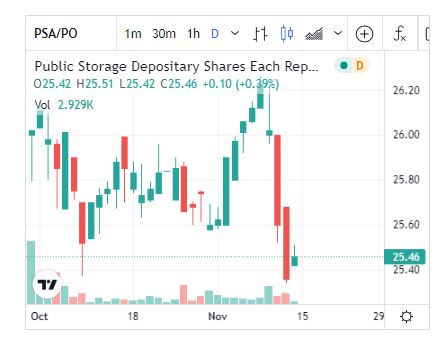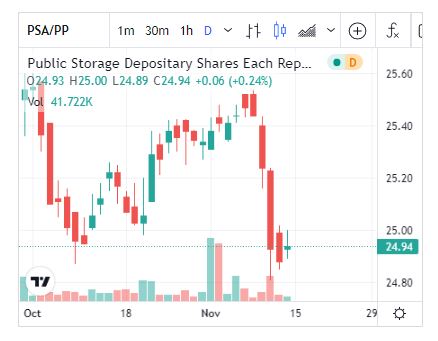Just some miscellaneous items you may have missed this week. All the comments and discussion on the Sandbox page and Reader Alert pages continue to be a never ending source of good information and ‘food for thought’.
On Tuesday fc asked–why is the 3.9% Public Storage Perpetual (PSA-O) which was issued in November, 2020 trading at $26.05 while the 4% perpetual (PSA-P) which was issued in June was trading at $25.24? Good question–no real answer to that question. You can see it fell after that question–BUT the 4.% issue fell as well–both victims of rising interest rates. The 3.9% issue remains out of whack with other PSA low coupons.


On another topic (inflation) Martin G posited this question–1% erosion in share price but still collecting dividends as compared to 7% erosion being in cash. Food for thought.
2whiteroses and mbg kicked around the pricing on the PhenixFin 5.25% new baby bonds–PhenixFin is the old Medley Capital–a BDC with a checkered past. Certainly there are other options available other than the PhenixFin offering.
Ken mentioned that we got a hard confirmation of the redemption of the 6.875% OFS Credit (OCCIP ) for sometime between 12/10 and 12/25.
David P mentioned that he received notice that the Logan Ridge Finance 6.00% notes (CPTAL) will be 68% redeemed on 12/6/2021.
Lastly folks (lots of them) continue to have trouble buying new issues–‘closing transactions only’ is the normal message.

“to all retirees or soon to be’s” Checked my usual this morning and saw this announcement https://www.cnbc.com/2021/11/12/medicare-standard-part-b-premiums-for-2022-jump-by-14point5percent-.html. I suppose this is”transitory” ha. ha. This is forever with no hope of earning anything positive in sight.
Whatever the annual cost of Medicare is, it is a financial life-saver for folks that need it. The costs of medical procedures are astounding; those of us on Medicare, who receive periodical statements for services, well know how much we are saving. (We have parts A and B, as well as a
supplemental HMO , which prior to retirement was our primary coverage- not Medicare
Advantage ).
Howard,
Same here. A and B, and Part D too. Not Medicare Advantage now, but thinking about it. Briefly, what do you see as the drawbacks to Advantage?
I know for me there’s only one question to ask when considering an Advantage plan – if I get cancer, for example, can I go to MD Anderson or Sloan Kettering for treatment if I choose? That’s why I do not have an Advantage plan – the answer is never yes……. I’m willing to pay the premiums to feel confident that I can get the best treatment at the best hospitals no matter where they are, even though we’ve been lucky enough to have minimal medical expenses in our lives to date, thankfully.
2WR
That was my sense too. As always, your perspective is much appreciated.
I would agree, but I can afford the extra up-front costs. I was a member (and provider) with an HMO, and likely would have gone with the same program via Medicare Advantage when I turned 65, but I lived across the county line and it wasn’t available at that time (it is now) in my zip code, so I used traditional Medicare part B. Subsequently I’ve been diagnosed with an uncommon condition, and am able to see, without extra hassle, specialists who are not in the network. If I were still in the HMO (via Advantage), I’d have to request (and not necessarily receive) an OK for each visit, special testing, procedures, etc.
There are advantage plans that allow you to go out of network so you can use any doctor you choose but in network doctors are cheaper. Also you can change plans every year if your situation changes. The craziest thing about Advantage plans is that the monthly cost varies significantly depending on the county of residency.
We have the old F plan rather than advantage and are grateful we did not take an advantage plan. My wife has pulmonary problems and we have had to take her to numerous pulmonary and infectious disease doctors. Finally an infectious disease doctor recommended that she go to National Jewish Hospital in Denver, the nations number one rated pulmonary hospital. We didn’t have to deal with the in network/out of network bull. We just went….she spent over two weeks there with every test known to mankind except for an SAT, ACT or driving test. Everything…I said EVERYTHING was paid in full. The flexibility that we have as to going to any doctor, having any test and going to any hospital or diagnostic center is worth the extra money we pay.
Ray, this is exactly why I would never select an Advantage Plan. Have you ever noticed that all the TV commercials, newspaper ads and mailed brochures are only pushing Advantage Plans?
I don’t think people realize that there is anything available except for the advantage ones. I learned a hard lesson years ago on network hospitals. I had a heart attack in 2004, ambulance took me to the hospital I ended up with two stents and my company hospitalization plan paid it. Four years later I began having symptoms so my wife took me back to the same hospital. Unfortunately our company had swapped plans and we never even thought about it. I was tagged with a $60k out of network bill. Negotiated back and forth with the hospital and ended up paying a bit over $16k to settle it. Our “G” plan costs more and does not have any drug plan so we have to pay about $60 a month for a great drug plan. Shop around though on any plan, the prices vary considerably for the exact coverage. Plus, if you don’t have any existing pre-conditions you can also swap insurance companies yearly. I did on mine this year and am paying half of what my original company premiums were. With my wife’s preexisting problems we can’t change.
The two options for Medicare are Supplemental Plans which are referred to as Original Medicare and the other group being Advantage Plans. The Advantage Plans are being pushed because they cost the govt less by using networks and controlling treatment options. With Original Medicare the patient can go to any doctor/medical facility that accepts Medicare rates. Once a retiree goes on an Advantage Plan they cannot change to Original Medicare, with a few exceptions relating to retiree moving to an area where Advantage Plan is not available.
I thought each year during enrolling one could opt into or out of all options. Are you stating that once an Advantage plan is chosen one can never change or one cannot change during a benefit year?
You may switch plans during enrollment period but premiums may be higher based on your medical history.
I’ve never seen an Advantage plan whose price is based on medical history.
If you have an Advantage Plan you can always select another Advantage Plan during open enrollment. However, if you select an Advantage Plan and stay in it for 12 months, which is referred to as the “trial period” , you have to go through “underwriting” to change to a Medicare Supplement Plan known as Original Medicare, it’s not automatic. Moving can also open the door to letting you switch from Medicare Advantage. Like any government program it’s complicated and you will want to discuss with an expert.
One can switch from Medicare advantage to Original medicare during open enrollment…but MAY be subject to underwriting prior to acceptance.
NH,
I signed up for Medicare for me and my wife about 6 months ago. The supplemental was more per month, but max out-of- pocket was $203/year, Medicare deductible. Most of the Advantage plans I looked at had co-pays and max out-of-pocket costs in the $4-5000 range. In that 6 months both of us would have spent at least $3-4000 each in an Advantage plan due to MRIs/tests, which more than covered a few years of the costs of the supplement. If you can afford it, I would go with the supplement. JMO
The others seem to share that opinion, as well. That’s how I was leaning to begin with, and these comments have been confirmation.
What I’ve wondered regarding statistical cost of medical procedures is what number is used in calculating the cost. Figuring out actual costs meaning actual monies transferred from somewhere to somewhere else when you have Medicare seems to be nigh unto impossible. You’ll see crazy billing summaries where a procedure is billed at $1999.99 and then you’ll see where what was paid was $19.99. So which figure is used when aggregating stats on the cost of procedures? And of course it gets even more complicated to figure out if you have secondary insurance… Which leads to another favorite rant – what other industry or producer of goods or services is allowed to tell you they cannot tell you the cost of your use of their products before you buy them???
“On another topic (inflation) Martin G posited this question–1% erosion in share price but still colleting dividends as compared to 7% erosion being in cash. Food for thought.”
If the cash is being held for a drop in the stock market, or just to buy day-to-day now, and not to purchase higher priced food, fuel, cars, etc, I don’t see it as a 6% difference.
When you want to buy, you better have cash.
or when you want to buy you sell something else. Major market drops do happen but a lot less often then I sit on the sidelines with cash waiting for the drop.
Just ‘food for thought’